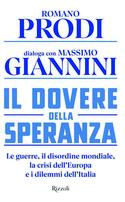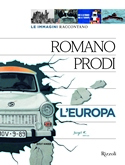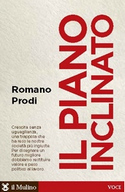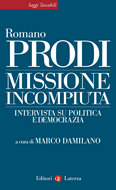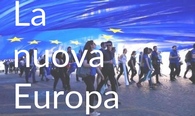In Italy a temporary solution, organized by the President of the Republic, will be found
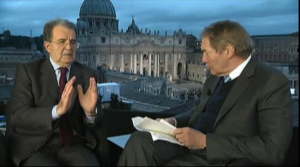 Interview to Romano Prodi, United Nations Special Envoy to the Sahel
Interview to Romano Prodi, United Nations Special Envoy to the Sahel
Interview to Romano Prodi from charlierose.com on Tusdey, March 12, 2013
We are in Vatican City on overlooking San Peter’s basilica with Romano Prodi. He was prime minister of Italy from 1996 to 1998 and then again from 2006 to 2008, and between these times leading Italy he was president of the European commission. Since October 2012 he is United Nations special envoy for the Sahel and I’m pleased to have him back on this program.
First let’s talk about Italy. This is the Economist: “Send in the clowns. How Italy’s disastrous election threatens the future of the euro”.
Italy is in Europe. So the two problems are linked. The euro, after last summer , is not in danger to be dissolved. I think that the euro will stay but in this context Italy is in this moment fragile, both because of its economy and because of its inability to have a government.
Let’s talk about politics, first. It happens, sometimes you have that new political aggregation that has an unexpected success because of the crisis of the existing parties, and Grillo’s, the Five Stars Movement exploited this. And now because there is a division among the existing parties we are in a stalemate. But I’m not desperate for that, because it happened in many occasions in many European countries. I think that we have to let the sand deposit itself and to wait that water became clear and some temporary solution will be found.
Like what ?
Like some sort of, as we call it in Italy, government of the President: a government where the majority vary case by case or with some temporary agreement. One of these solutions will be found in order to let the situation calm down.
So look at the situation, you have Mr Berlusconi getting around 30% of the votes, Mr. Grillo, getting 25% of the votes. One man is a comedian, and the other man … is a comedian…
I’m the person that should not talk because I have beaten Berlusconi twice, you know, and he has always lost with me in the elections but he made the campaign as a salesman, not only telling “I will decrease your taxation” but “I’ll give back the taxes you have paid last year”. This is unbelievable, but in a moment of deep economic crisis, 25% of the Italians trusted him. But look, he lost more than 10% of the votes, it was not a success because he had a very strong majority in the past. And then, he lost a lot of votes but he was able to give the illusion that he could be the saviour in such a difficult economic condition.
What can happen to Mr. Monti, that had 10% of the votes ?
Mr. Monti was credited with almost double the number of the votes he effectively got, so it was not a winner, but he is still in politics. I don’t know what will he chose, being president of the Senate or he will take his time in order to reorganize the party. It will be almost impossible that he will be Prime Minister again, unless he will prolong it for a very limited time.
He does not have enough votes to back or be part of the (Bersani) coalition.
They have enough votes in the Lower Chamber but not in the Senate, the two Chambers have the same power. It’s identical and so you need the confidence vote in both of them. This is why you need some sort of compromise organized by the President of the Republic.
What do you want ?
Personally, I was a centre-left leader and so I’m not happy for the result of the elections, but I’m not active in Italian politics. So I look as a spectator hoping to have a solution very soon.
Do you really believe there will be a solution soon?
Yes, it will be a temporary solution, not for five years, but there will be a solution.
Returning to the euro, what is going to happen to the Euro zone?
The Euro zone was in danger until July, two or three countries in open revolt, Greece, Spain and Portugal. In Italy, luckily, we still have a strong industry and exports are going very well, but internal consumptions are going down. This is an absurdity, you know, because we exports well, we are competitive but, because of our austerity the internal demand is collapsing, and this is absolutely out of any rule.
How do you increase internal demand ?
We can give a stimulus to internal demand because we are safe from European regulations on deficit and we can give a push, on that but even more I hope that Germany and other European countries will give another stimulus. For an economist, it is difficult to understand that Germany has a big surplus, an enormous surplus, in trade balance and they have zero growth and no inflation. Why they don’t stimulate the economy? Because of political problems connected to their elections they hesitate. But I think that in some way, is Germany interest and European interest to have a stimulus, and we need it. An internal stimulus but even ore an European stimulus.
And how do you see the U.S. economic recovery ?
Better than I have feared. I think that it is good news and I do hope it will go on. I’ve studied the statistics and I tend to think that it will go on.
Do Europeans admire president Obama ?
Yes, because it is a symbol of change and of novelty. Of course they were more in love in the first elections than in the second, and this always happens, but still more than in other cases. Because there is some sort of familiarity. In spite that we cannot say that Obama was the US president more interested in Europe, because he was far away from Europe, he didn’t studied in Europe, he was not educated in Europe, but he is loved.
You are an economist, and you come from that issue, rather than foreign policy, but you were the head of Europe Commission. What does the World must do about Syria aware that it is becoming almost like Lebanon ?
Now there is no agreement, there is a disagreement between Russia and the other members of the UN Security Council, China is at the window, and so I don’t think that strong decisions can be made. I’m pessimist, and I think that this –let us call- “civil war” now will go on still for a while. I don’t see a solution tomorrow, even if some progress was done last week here in Rome, Kerry was working in order to try to move the situation. But there is not yet the agreement that it is needed.
I assume you know John Kerry.
Yes, I know him well. I had once met him first time here in Rome and I was happy, because he was flexible, and generally, an American secretary of State only answers questions. He was not only answering questions but was asking, arguing and he was very open to discussion, and intelligent of course. I do hope that with this human touch he will help the solution of problems.
 When you look at Africa, the same Economist magazine has a big story about Africa “Aspiring Africa”. You are the UN envoy, what is you goal ?
When you look at Africa, the same Economist magazine has a big story about Africa “Aspiring Africa”. You are the UN envoy, what is you goal ?
My goal comes form the secretary of UN that said: “Look, Sahel is a big area. It’s a strip three thousands five hundred miles long form Senegal to Eritrea, seven hundred miles large that it is never been considered like a unity but is very homogeneous in terms of poverty, in terms of dry area, in terms of malnutrition, in terms of child mortality. It is the only area of Africa that it is not moving, And so the UN Secretary said:” Let us try to have a glance, not country by country but as an unique area and let’s try to link them in order to help development”. This is the long term goal.
Of course, when we have a case like Mali, there is a side obligation to try to help the process of peace and the establishment of a new government.
With respect to Mali do you think that the French intervention is achieving the success that it hoped to ?
Until now yes. Honestly, I’m generally not inclined to the war, but I was in Mali in that moment, and the intervention was absolutely unavoidable. The terrorists coming from the north were arriving to the capital and there was no choice. Now, the goals of the war are got in terms of reoccupying the north, but the terrorists disappeared in the land. And our fear is that they will go to Libya.
They were coming from Libya too…
Yes, coming but returning in big numbers to Libya. The western world had always not evaluated enough the problem of Sahel, because you have such a big area without borders and the terrorist have the best place to grow. Because there is a lot of illegal economy, because before the war a lot of money was coming from Libya, then, after the end of Gheddafi, now you have an increase in drug trafficking, kidnapping for ransom, other illegal activities, immigrates brought, and now you have all the society that must change from this deep poverty.
So the United Nations job is to create some sort of environment for the growth. And our idea is to involve local universities, local societies. We had a first meeting in Dakar for putting in order the priorities, let’s say agriculture, centralized electrical energy, it must have the same diffusion that in Africa the portable telephone had. The big revolution of the portable telephone, schools, hospitals,… But we have to start immediately that, in order to let Sahel be linked to the rest of Africa.
Because remember that the new event in the world, is that Africa – globally speaking, not Sahel only – is moving. If you take 2013 growth statistics, first you have China but after that you have Africa.
Yes, they start from a low base but…
Please, don’t misunderstand me, of course they are in a terrible poverty, horrible, but when ten years ago they were desperate, now they are beginning to hope. And so the aim of the Secretary General is to help Sahel to be linked to the rest of Africa, with infrastructure, economy and so on. And this is the job I have.
Of course, on the other side, we have to collect money to do it. And you have to remember this: that differently from Syria, or from Afghanistan, here you have all the Security Council together because everybody is frightened by the new terrorism. So you have China, Russia, United States going in the same direction. And I want to exploit it. To connect them and adopt very quick procedures in order to make the intervention as rapid as we can.
It’s very good to see you in Italy so thank you to let me talk with you. It’s very cold right here. It’s Tuesday and they are now in the Sistine Chapel and they were probably being voting this evening for the first time on this Tuesday and we may have a new Pope this week. It’s an exciting time to be in Rome and I thank you for your time.
Thank you and I hope that better weather will come.






